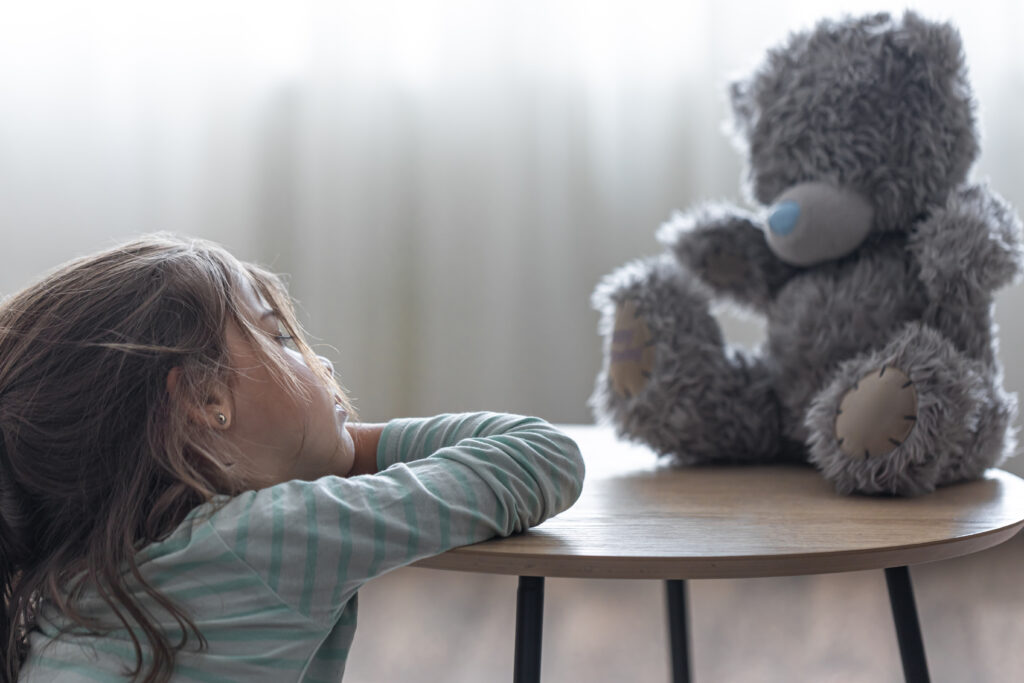Anxiety in kids: How stress affects the young brain & Why early support matters

If your child often worries, avoids school, or seems overwhelmed by small tasks, you’re not alone.
Many parents today are navigating the challenges of anxiety in children without fully understanding how stress can impact brain development. Unlike adults, kids may not always express their fears in words—making it crucial to recognize the early signs of anxiety.
In this blog, we break down the causes, signs, and effects of anxiety on the young brain and share practical tips on how to help kids with anxiety—including teenagers struggling with panic attacks.
When does anxiety in children become a concern?
Every child feels anxious at times—before a big test, meeting new people, or trying something unfamiliar.
These short-term worries are a part of growing up. However, when anxious thoughts become intense and persistent and begin to interfere with everyday life, they become a concern.
Some common signs of anxiety in children may include:
- Excessive worry about everyday tasks or future events
- Difficulty sleeping or frequent nightmares
- Avoidance of social situations or school
- Unexplained stomach aches or headaches with no medical cause
- Irritability, restlessness, or trouble concentrating on tasks
While many children learn to manage their fears over time, others need guidance and tools to cope with their emotions in healthy, constructive ways.
What are the causes of anxiety in children?
Understanding the causes of anxiety in kids can help parents respond with empathy and support. Anxiety may develop due to a combination of:
- Genetics and family history of anxiety or mental health issues
- Fear of failure, difficulty keeping up with studies, or pressure to perform well
- Struggles with making friends, bullying, or feeling left out
- High sensitivity or temperament
- Parenting dynamics, including overprotection or unrealistic expectations
- Media and screen exposure, especially to distressing content
It’s important to remember that anxiety is not a result of weakness. It’s a natural stress response—just one that needs to be regulated more effectively in some children.
How do stress and anxiety affect the developing brain?
Think of the brain as a command centre—when a child is under constant stress, this system can become disrupted.
During moments of anxiety, the body releases cortisol, a stress hormone that helps us respond to immediate challenges. While short bursts of cortisol can be helpful, prolonged exposure can interfere with healthy brain development in several critical ways:
- Memory and learning: Excess cortisol may shrink the hippocampus, making it harder for kids to concentrate and retain information.
- Emotional control: Anxiety overstimulates the amygdala—the brain’s fear center—leading to heightened emotional responses.
- Decision-making: Stress can impair the prefrontal cortex, affecting a child’s ability to plan, make decisions, and control impulses.
If not addressed early, anxiety may increase the risk of long-term mental health challenges like depression or chronic stress.
How to help your child with anxiety?
Helping children with anxiety begins with acknowledging their feelings and offering consistent support. Here’s how parents and caregivers can make a real difference:
- Encourage open communication: Let your child talk about what worries them. Avoid judgmental or dismissive responses like “You’ll be fine.”
- Establish routines: Predictability gives children a sense of control. Stick to regular sleep, meal, and activity schedules.
- Teach calming tools: Breathing exercises, mindfulness, or journaling can help kids process anxious thoughts and regain calm.
- Promote independence: Gently push them to face fears through small, manageable steps—like answering questions in class or joining group activities.
- Minimize exposure to anxiety triggers: Limit screen time, monitor social media, and reduce overstimulating environments.
- Model healthy coping: Children often mirror their parents’ behaviors. Demonstrate how you handle stress positively.
- Don’t hesitate to seek help: If anxiety is interfering with your child’s daily life, don’t hesitate to consult a specialist.
How to help a teenager with anxiety and panic attacks?
Teens may not always open up, but your support matters. Here’s how to help a teenager with anxiety and panic attacks:
- Stay calm and present during an attack—help them slow their breathing
- Avoid minimizing their experience—say things like “I’m here with you” instead of “Calm down”
- Encourage professional support—therapy, counseling, or even group support for teens
- Teach them to recognize triggers and develop a personal coping plan
- Foster emotional safety—let them know it’s okay to talk about feelings without fear of judgment
Remember, your role isn’t to “fix” their anxiety, but to walk with them through it with compassion and guidance.
Nurture stronger, calmer young minds with Kids Neuro Clinic
Childhood anxiety doesn’t have to define your child’s journey. With early intervention, compassionate guidance, and the right tools, kids can learn to manage stress, build emotional strength, and thrive in their daily lives.
Kids Neuro Clinic is one of the specialized pediatric neuroscience centers in Dubai. We provide comprehensive care for infants, children, and young individuals facing a wide range of neurological, developmental, behavioral, and psychological challenges. Whether your child is dealing with anxiety, panic attacks, or other emotional or developmental concerns, we’re here to provide expert care tailored to their specific needs.
Book a consultation today and take the first step toward a calmer tomorrow.
About kidsneuro
Kids Neuro Clinic, based in Dubai, is one of the UAE’s leading pediatric neuroscience centers, offering expert care for infants, children, and adolescents with neurological, developmental, behavioral, and psychological disorders. Our multidisciplinary team includes top-trained pediatric neurologists, psychologists, and developmental specialists from renowned institutions in the UK, Europe, and the USA, serving families across the UAE and GCC.

Tips for Nourishing Your Child’s Health: A Guide to the Best Diets for Autism and ADHD


